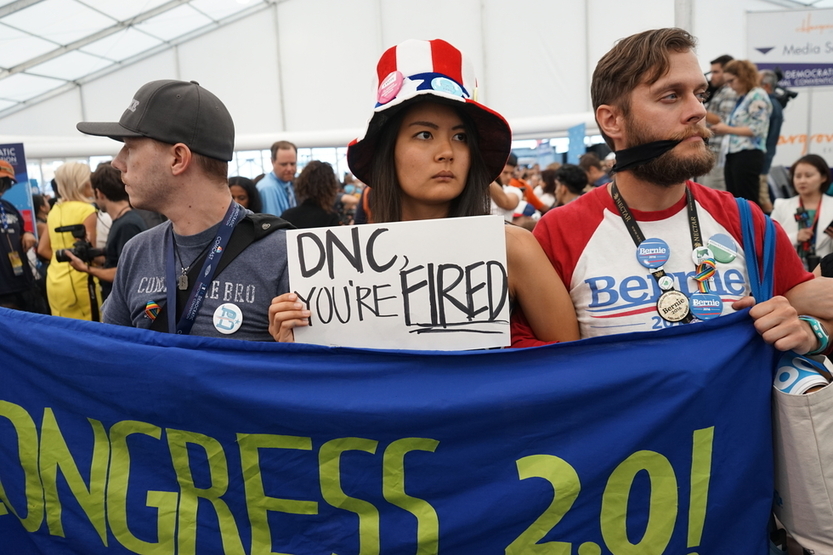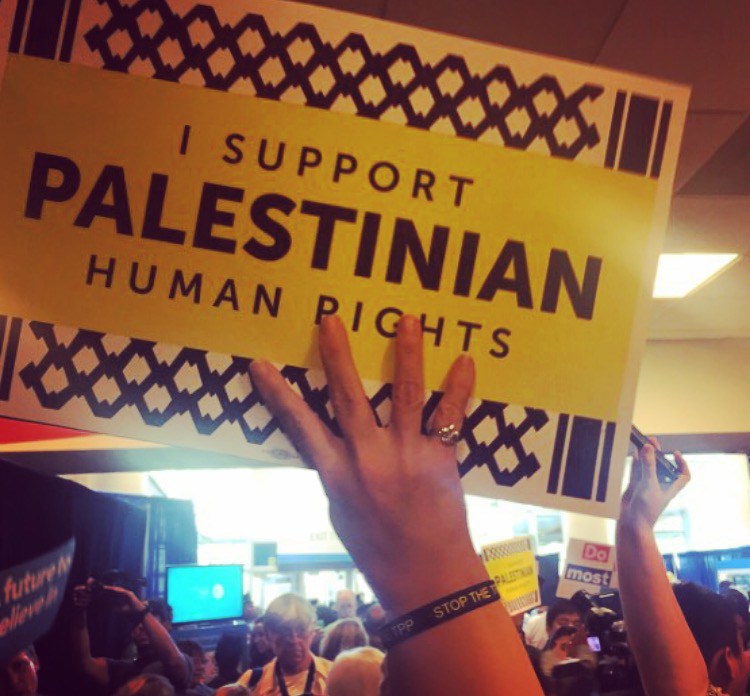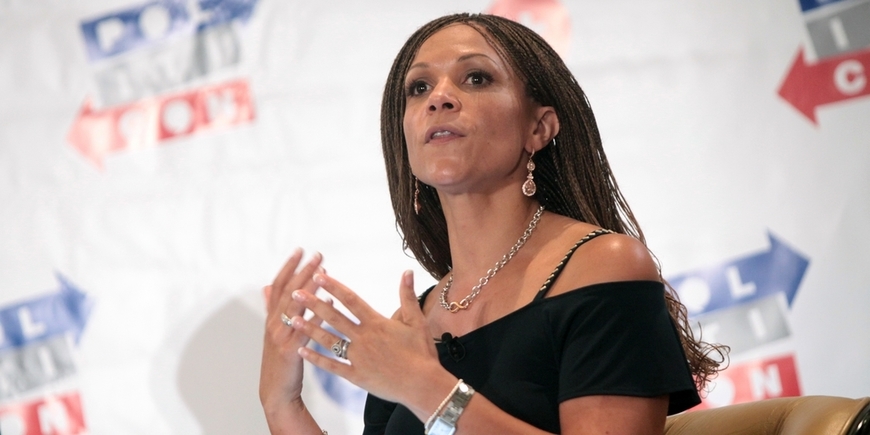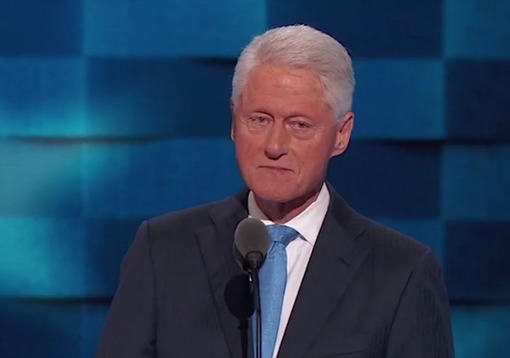
James Reinl
Middle East Eye
PHILADELPHIA, United States – Few Arab or Muslim Americans expected Donald Trump’s coronation at the Republican National Convention (RNC) in Cleveland to be a joyous affair. After three days in Pennsylvania’s sweltering heat, the Democratic shindig has proven similarly underwhelming.
US television networks have highlighted the lacklustre support grassroots activists from both main parties have afforded their nominees: Trump, a tough-talking New York tycoon, and his Democratic rival, the career politician Hillary Clinton.
But the subtext – that Trump’s bashing of Muslims, Mexicans and other groups is countered by a Democratic “big tent” to shield all minorities, is increasingly being challenged by those attending the Democratic National Convention (DNC) here in Philadelphia.
While the RNC crowd in Cleveland was whiter, and without a niqab in sight, the politics are not so different at the DNC, Raed Jarrar, a policy analyst at the American Friends Service Committee, a Quaker group, told Middle East Eye.
“The optics are different between the DNC and the RNC, which was less diverse, but the actual policies between the two parties are, unfortunately, almost identical,” said Jarrar, a Washington-based blogger.
Jarrar and others highlight the Democratic platform, or manifesto, which continues to prioritise the rights of Israelis over Palestinians, despite the efforts of Clinton’s former Democratic rival, Bernie Sanders, to treat both sides in the decades-old conflict equally.
But what really bugged Muslims this week was Bill Clinton, the Democratic nominee’s husband and former president, who started riffing at the tail-end of an impassioned speech about why Americans should send his wife back to the White House.
“If you’re a Muslim and you love America and freedom and you hate terror, stay here and help us win and make a future together, we want you,” Clinton said, naming the various groups with a stake in a Democrat-led America.
Though seemingly harmless, it jarred with many Muslims because it seemingly accepted an assumption that they must work harder to show patriotism than others – a touchy subject in the wake of post-9/11 racial profiling and police raids on mosques.
“The assumptions behind this are that Muslim Americans should be singled out and required to prove their loyalty and Americanism more than others,” said Jarrar. “The assumption that they should be kicked out of the country is really shocking to hear in 2016.”
Similarly, the failure of the Democrats to bring more of Sanders’ input into Israel-Palestine policy remained a bone of contention among the Muslims and Arabs who are ideologically torn over supporting America’s main liberal party.
The Democratic platform, agreed in Philadelphia this week, calls for “a strong and secure Israel” of which Jerusalem should “remain the capital”. Democrats pledge to “oppose any effort to delegitimise Israel, including at the UN or through” a boycott movement, known as BDS.
“Language against BDS shows how biased the platform is,” said Jarrar. “It’s another example of how US citizens don’t have many options when it comes to US foreign policy and militarism. Democrats and Republican candidates are almost identical.”
James Zogby, founder and president of the Arab American Institute (AAI), sat on the platform committee and said there was much “good language” on Middle East issues in the document, but ultimately warned that it would fail to advance the stymied Middle East peace process.
Pursuing the Democratic agenda towards Israel would continue the “region’s depressing and dangerous downwards spiral of oppression and violence”. The more pro-Israel Republican policy, alternatively, is worse and would yield “disaster,” he added.
Against this backdrop, Arab and Muslim Americans would doubtless have a tougher time under a President Trump.
The celebrity realtor has famously rounded on Muslims, unveiling plans to stop Islam’s adherents from entering the US. He has also blasted Syrian refugees and an unverified number of New Jersey residents who celebrated the 9/11 attacks.
Although some have joined the “Muslims for Trump” group, Zogby doubts they represent a significant chunk of the estimated 3.5-4.5 million Muslim Americans.
On 8 November, US Muslims will mostly back Clinton over Trump, despite the misgivings expressed by Muslim activists in Philadelphia this week, Zogby said. The former first lady may need it – opinion polls show she trails Trump by 1.1 percentage points.
“I dare say that the Democratic ticket will do very well, the Republican ticket will not do very well, despite their cherry-picking efforts,” Zogby said of Muslim voters on the side-lines of the convention this week.
According to Maya Berry, executive director of AAI, a lobby group, an estimated 3.7 million Arab Americans – a mixture of Muslims, Christians, atheists and others – may play a key role in the battleground states that could yield the keys to the Oval Office.
According to Berry, Arab Americans represent some five percent of voters in Michigan, a key swing state, as well as two percent of voters in New Jersey, Pennsylvania, Virginia and other battlegrounds.
“So in an election that’s close, we’re definitely within the margin of victory on that,” Berry told journalists in Philadelphia.
Arab Americans are not yet counted in the US census, so the population figure of 3.7 million may be an inflated estimate that equates to about 1.1 percent of the population. Latinos (17.4 percent) and blacks (13.2 percent) are bigger chunks of the melting-pot nation.
With traditions of social and economic conservatism, they were evenly split between the main parties until the turn of the century, and backed George W Bush by 44.5 per cent in the 2000 presidential election, according to pollster John Zogby.
Since the 9/11 attacks on New York and Washington, Arab Americans edged left and currently favour the Democrats (about 40 per cent) over the Republicans (20 per cent), while 30 per cent remain independent, according to AAI.
Arab Americans are typically small business owners and professionals who are swayed by the same bread-and-butter issues as other Americans – jobs, taxes, schools and hospitals. US foreign policy is important, but not paramount, according to AAI studies.
They are being driven even further into the Democratic fold this election cycle, analysts say. There are exceptions, though. Mariam Noujaim, a Maronite Christian from Lebanon who has lived in California since 1979, will vote for Trump in November.
“He’s going to attack the terrorists. You can’t be lenient with these people,” Noujaim said of Trump’s policy against the Islamic State (IS group). Bombing IS oil fields will “cut off their money source, their oxygen” and help address the violence that plagues the region, she told MEE.
Source: www.middleeasteye.net










